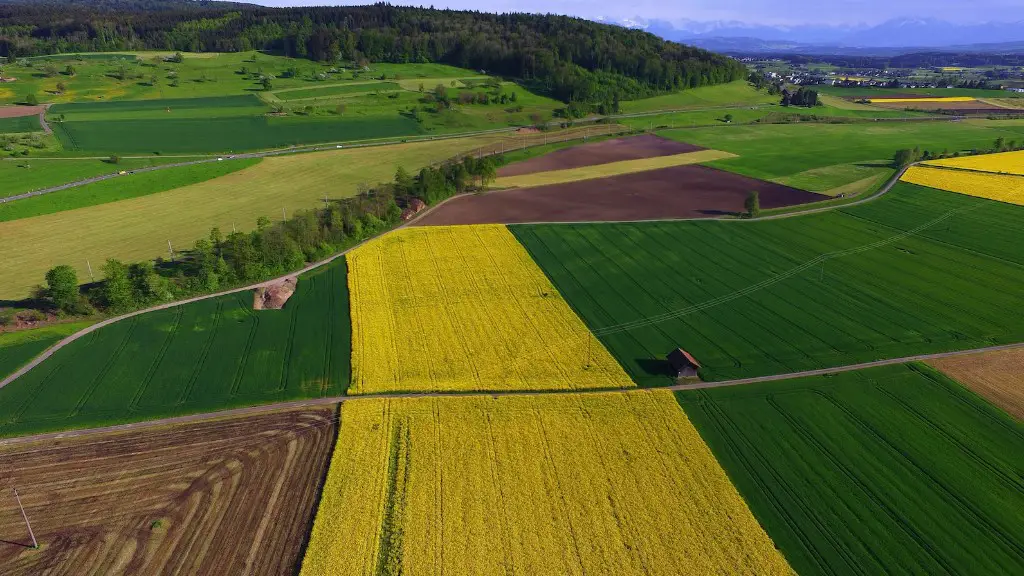As an academic expert, it is clear that understanding the factors which affected the agricultural impact of colonial regions is imperative. Contraction and globalization of early colonial land regimes caused social rearrangement, redistribution, and new forms of labor organization in order to produce the agricultural products needed for European consumption. Traditional pre-colonial farming and land use practices were also impacted, leading to new negotiations of rights, access, and forms of subsistence. In this paper, I will explore the key factors that allowed agriculture to significantly impact colonial regions.
European Expansion
The first factor is European expansion. The Europeans began to gain a foothold in the colonial regions by seeking new lands, producing raw materials and minerals, and trading with local inhabitants. The Europeans also established trading posts and introduced new crops. This allowed them to have control over the production and distribution of said crops and increased the Europeans’ control over the colonial regions. This expansion helped facilitate the development of agriculture in the colonies, as it allowed for the combination of traditional agricultural practices with new European technology and methods.
The introduction of cash crops and technology also allowed for large-scale agricultural production. New technologies such as plows, fertilizers, and mechanization allowed for a more efficient use of land and resources, further increasing the impact of agriculture in the colonial regions.
Furthermore, the new markets created by the Europeans provided an economic incentive for traditional farmers to adopt new techniques and technologies. This allowed them to increase their productivity, generating higher profits and helping to further the development of agriculture in the colonies.
Colonial Policies
Additionally, the colonial policies put in place by the Europeans affected the agricultural impact of the colonies. These policies aimed to exploit the resources of the colonies for the benefit of the Europeans, leading to the confiscation of land from traditional farmers and squatters. This often resulted in large-scale landgrabs, leading to the displacement of the local population, who were often unable to reclaim their land or even survive without the resources it provided.
Moreover, the colonial policies additionally contributed to the plantation economy, which was heavily reliant on slave labor. The Europeans relied on these plantations to produce the agricultural products they needed, as the agricultural commodities produced in the colonies were trading products that provided the Europeans with a lucrative source of income. This further added to the agricultural impact in the colonial regions, as the plantations produced large amounts of agricultural commodities, providing a large source of agricultural output.
The European-imposed colonial policies thus allowed the Europeans toexert greater control over the land and resources of the colonies, leading to large-scale landgrabs, displacement, and the exploitation of slaves. This enabled them to increase the agricultural output of the colonies, further enhancing the impact of agriculture on the colonial regions.
Imperial Enclosures
Imperial Enclosures are yet another factor that increased the agricultural impact of the colonies. This concept refers to the compulsory acquisition of land for the purpose of agricultural production. This allowed for a more efficient use of the land and resources, as the owners of the imperial enclosures could control who farmed on their lands, as well as controlling the types of crops grown and how much was produced. This forced many farmers into a more commercialized, large-scale type of farming. This allowed for the increasing production of agricultural products to meet the demands of the Europeans.
In addition, the imperial enclosures also helped facilitate the formation of new agricultural markets, which were created to trade the agricultural commodities produced in the colonies. This allowed for the further development of agriculture and its impact in the colonial regions.
Legislation and Regulations
Finally, the introduction of legislation and regulations further increased the impact of agriculture on the colonial regions. Such legislation was designed to protect the interests of the Europeans and ensure their control over the colonies. This included land reform laws that enabled large scale landgrabs and the implementation of slavery laws to ensure slave labor was utilized in the plantations.
Such legislation and regulations thus contributed to the increase in European control over the colonies, the development of the plantation economy, and the growth of large-scale landgrabs. This all helped to facilitate the agricultural growth and its impact in the colonies.
Social Structures
Social structures also impacted the agricultural impact of the colonies. Pre-colonial societies relied heavily on traditional methods of farming, land use, and subsistence. However, the introduction of European agriculture, together with the policies and regulations they imposed, drastically changed traditional rural life. This led to increased economic activity, the restructuring of social networks, and the emergence of new agricultural and economic institutions.
Furthermore, these changes ‘disrupted existing social and economic structures, transforming pre-colonial social hierarchies and creating new power relations in the colonies. This allowed for a reform of land ownership and tenure systems, as well as a restructuring of labor organizations and production systems. These changes, in turn, contributed to the agricultural growth and its impact in the colonial regions.
Technology and Infrastructure
The technological advancements of the colonial period also affected the agricultural impact of the colonies. New technologies and advances in infrastructure allowed for an increase in agricultural productivity and efficiency. This enabled farmers to produce more crops and provide the necessary goods for burgeoning European markets. Improved irrigation and road networks allowed for increased access to markets and resources, while new agricultural techniques such as crop rotation and mechanization increased yields.
These improvements, together with the introduction of new agricultural products and techniques, potentiated the growth and impact of agriculture in the colonial regions. This allowed for a further transformation of traditional land use and labor practices, as well as an increase in profits and wealth for those involved.
Colonial Discourse
Colonial discourse was yet another factor that contributed to the increased agricultural impact of the colonies. The European discourse of progress and the advantages of industrialization led to an emphasis on the commercialization of agriculture, as well as its centralization and specialization. This led to the production of large amounts of single crops for European markets, shifting away from traditional farming practices. The new discourse of agricultural improvements also helped to legitimize the colonial enterprise and to create further opportunities for trade.
The European discourse of progress thus enabled the development of commercialized agriculture and its impact in the colonial regions. This discourse enabled the Europeans to justify and legitimize their role in the colonies, while paving the way for further exploitation of resources and competition among European powers.
Conclusion
In conclusion, multiple factors enabled the agricultural impact of the colonial regions. European expansion allowed for an increased control over the resources and for the introduction of new technologies, crops, and new markets. Colonial policies, imperial enclosures, legislation, and regulations helped facilitate an increase in large-scale landgrabs and the exploitation of resources. Social structures and networks of pre-colonial societies were drastically altered, and technological advancements and infrastructure improvements allowed for further agricultural growth. Finally, European discourses of progress also contributed to an increase in the agricultural impact of the colonies. Thus, these factors enabled the transformation of traditional farming and land use practices, with important consequences in the economic, political, and social realms.




